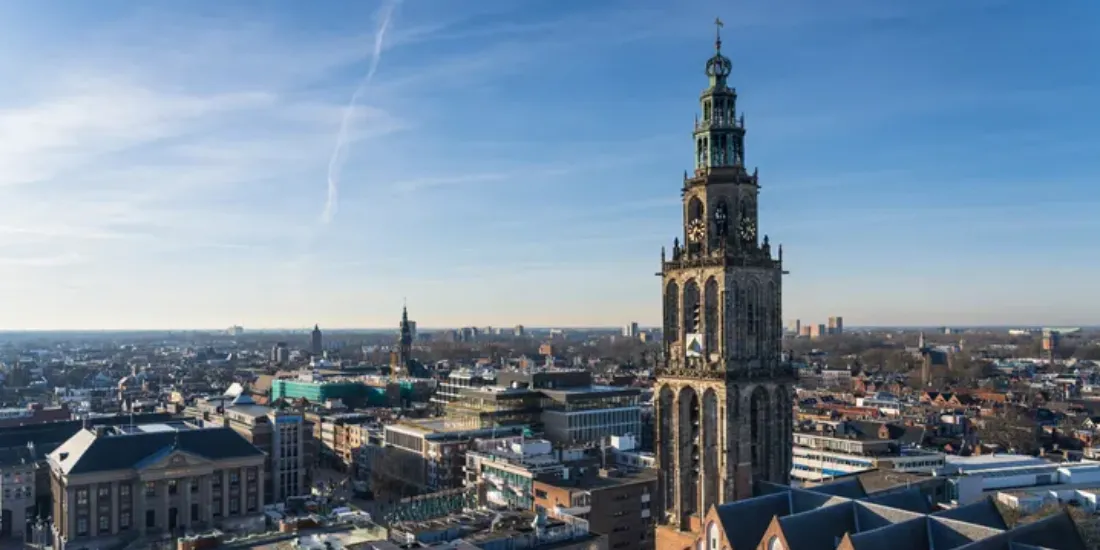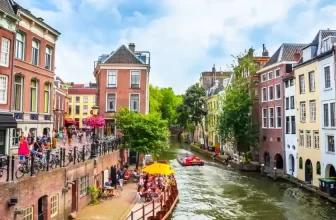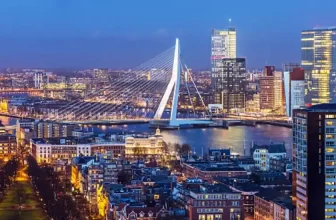
Arriving in Groningen – What It Really Feels Like
The first thing that hits you when you step out of Groningen train station isn’t the weather-it’s how ridiculously bike-packed the city is. Like, this isn’t just a Dutch stereotype. There were more bikes in one glance than people. There’s this light scent of waffles from a stand nearby, mixed with a damp breeze that feels cooler than expected for late August. The city sort of buzzes quietly-like it’s calm, but alive in its own way.
I arrived mid-afternoon, jet-lagged and slightly panicked, because I hadn’t practiced enough Dutch (you don’t really need to, but still). I dragged my suitcase past canals, cafes, and modern libraries until I found my housing-an old building turned student flat, creaky stairs included. Someone was playing indie music from a cracked window. A girl zipped by on a bike with three tote bags and no helmet. I swear I saw a student reading Plato on the sidewalk, casually.
That was my “welcome to Groningen” moment, and if you’re reading this study guide in Groningen, trust me-it’s the stuff nobody tells you about upfront that ends up shaping your whole year (or degree). So let’s get into it. Honest, useful advice about life, study, and survival in the Netherlands’ most underrated student city.
Why You Should Study in Groningen in 2026
Here’s the thing-if you’re even remotely considering overseas education in the Netherlands, 2026 might be one of the best times to do it. For one, Dutch universities are gaining even more traction internationally, and Groningen consistently ranks as a top student city in Europe-without the cost of Amsterdam or the overcrowded English-speaking expat scene of The Hague.
Some key stats and benefits:
- The University of Groningen ranks in the top 100 globally (QS 2025).
- Over 31,000 students, and more than 20% are international.
- The Netherlands’ education system is highly regarded for its focus on independent learning, real-world application, and group projects.
- Groningen was voted the #1 “student-friendly city” in the Netherlands in 2024, mostly thanks to its affordability, bike-first infrastructure, and overall vibes.
- With the Dutch government investing in green tech, digital health, and AI, the regional job market is opening new doors for graduates-especially those willing to stay and work via residence permits post-study.
Why 2026 specifically? EU updates to visa and residence regulations (expected around 2026) could make it easier for internationals to stay post-graduation under the highly skilled migrant program. Plus, universities are becoming more aggressive with English-taught international degree programs and remote/hybrid options.
Why Groningen Is So Popular with International Students
Let’s be honest. When people think of studying in the Netherlands, they picture Amsterdam. But Groningen? It’s like Amsterdam’s chill, younger cousin who drinks oat lattes and actually reads the books in their bag.
Seriously though-Groningen is built for students.
- A fifth of the city population is made up of students-it feels like the city exists because of its universities.
- English is spoken almost everywhere. You’ll hear Dutch, sure, but don’t worry-you won’t need to be fluent. A lot of Dutch students speak fluent English too.
- The vibe is incredibly international. In my class alone, we had people from Spain, Canada, Vietnam, Iran, and Brazil.
- The city supports students through mental health services, language classes, academic workshops, housing support, and mentorship programs directly tied to the university.
Oh, and because everyone bikes, you’ll quickly meet new people just from cycling next to them every day. Sounds weird, but true.
Top Universities and Colleges – Your Academic Study Guide in Groningen
Let’s break it down. Groningen only has a few main institutions-but they’re strong ones.
1. University of Groningen (Rijksuniversiteit Groningen – RUG)
- Global Ranking: Top 100 (QS), top 3 in the Netherlands
- What It’s Known For: Artificial Intelligence, International Business, Medicine, Law, Energy/Environment Studies
- Tuition (Non-EU): €8,000–€17,500/year depending on program
- Vibe: Academic, respected, diverse, more traditional than you’d think
- Standouts:
- BSc International Relations
- MSc Human Movement Sciences
- LLB in International and European Law (fully in English)
- Campus Feel: Spread across the old city centre; lots of old-world meets modern-library.
2. Hanze University of Applied Sciences
- Focus: More practice-driven, with built-in internships
- Best Programs:
- International Business
- Sensor Technology (seriously cool)
- Game Design
- Tuition: €7,000–€10,500/year
- Student Life: Big on creating, not just studying. Spaces for art, startups, podcasts, media
Many international students start at RUG and connect with Hanze students often through projects or co-working spaces.
Student Accommodation in Groningen – How to Find It and Where to Look
Let me be straight with you-finding student accommodation in Groningen is hard. Not impossible, but you have to start early and be ready to hustle.
1. SSH Student Housing
- Managed by the university
- Prices: €400–€600/month (includes utilities)
- Rooms are furnished, includes student support
- Pros: Reliable, safe
- Cons: Limited availability
2. HousingAnywhere & Kamernet
- More independent and flexible
- Prices: €350–€700 depending on location
- You’ll find both shared flats and studios here
- Tip: Watch out for scams. If someone asks for a deposit before a viewing or video call-run.
3. Facebook Groups (e.g., “Groningen Student Housing”)
- Very active but competitive
- You’ll need to act fast and send friendly intros. Think mini-cover letters.
4. Private Student Residences (The Student Hotel, Nest, etc.)
- Modern, with gym/lounge/co-working included
- Prices: €700–€1,000/month
- Pro: Instant community
- Con: Expensive
Best Neighborhoods for Students – Where to Live in Groningen
Zernike
- Near Hanze + Science & Engineering faculty at RUG
- Applied sciences crowd
- Rent: €400–€650/month
Oosterpoort
- Artistic, quieter, popular with older students
- Gorgeous canal paths, coffee shops
- 10-minute bike to most campuses
City Centre (Binnenstad)
- Historic, lively, but more touristy
- Rent: €600+ usually
- Close to nightlife + uni buildings
Paddepoel/Vinkhuizen
- Slightly further out (10–15 mins by bike)
- Cheaper rent
- More family/pensioners nearby, but quiet and calm
What Does It Cost to Live in Groningen?
| Category | Monthly Cost (EUR) |
| Accommodation | €400–€800 |
| Groceries & Food | €150–€250 |
| Health Insurance | €80 (basic mandatory for NL) |
| Transport (bike upkeep) | ~€15–€30 |
| Phone + Internet | €25–€40 |
| Social/Leisure | €50–€150 |
| Books & Supplies | €30 |
| Total (Average) | €750–€1,300/month |
Money tips:
- Cook at home. Groceries at Albert Heijn cost more; Lidl and Aldi are cheaper.
- Share bikes or get a second-hand one from Swapfiets (€20/month).
- Use ISIC or student discount cards at cinemas, stores, and restaurants.
Students overspend most on… food delivery. Guilty.
Scholarships and Financial Aid in Groningen – What’s Actually Available
1. Holland Scholarships
- €5,000 one-time award for non-EU students
- Based on academic achievement and motivation letter
2. Eric Bleumink Fund (RUG Only)
- Full tuition + living costs, super competitive
- Apply via your faculty during admissions
3. Hanze Scholarships for Non-EU Students
- Up to €2,500/year
- Based on academic merit
4. External Scholarships:
- Orange Tulip Scholarship for students from specific countries
- Home-country education loans or grants (E.g., Indian NSFA or CSC China)
Application tips:
- Deadline for most: February 2026
- Be genuine in statements-show who you are, not just your grades
- Reference letters MATTER
Application Process – Start to Finish
- Research Universities/Programs
- Start by Oct 2025
- Check Admission Requirements
- IELTS (6.0–7.0 depending on course)
- Transcripts + Diploma(s)
- Motivation Letter + CV
- Apply via Studielink.nl
- Central Dutch application platform
- You’ll also complete a university-specific portal after that
- Wait for Conditional Offer
- Confirm Offer + Pay Tuition Deposit
- Apply for Visa (MVV + Residence Permit)
- Usually handled by the university
- Plan Arrival + Book Housing
Common mistake: Not compelling enough in your personal statement. Make it personal. Real.
Visa and Work Rules – Navigating the Netherlands Student Permit in 2026
Required:
- Tuition payment proof
- Valid passport
- Proof of funds (€13,000+ wired/available)
- Birth certificate + health insurance
Work Rights:
- 16 hours/week OR full-time during breaks
- Must have a work permit arranged by your employer (harder to get)
After Graduation:
- Orientation Year Visa (Zoekjaar) lets you stay 12 months to job hunt
- You can convert to Highly Skilled Migrant Visa if hired by a registered company
Fun fact: jobs in tech, AI, sustainability, and education are in high demand.
Transportation in Groningen – Bikes, Buses & Beyond
Let’s be real-you don’t have to master the bus system. You just need a bike, period.
- Bike Sharing (Swapfiets): Starts at €16/month
- Local Buses: €2–€3 per ride, or €40/month subscription
- Apps to Download: 9292, NS (trains), OV-chipkaart (travel card)
- Trains to Amsterdam: €25–€30, ~2.5 hours
Tip: Use Google Maps Bike Mode. Hidden lifesaver in your first month.
What Student Life in Groningen Is Actually Like
Expect:
- Morning lectures, lots of self-study, few contact hours
- Intense group work
- Free time where you choose how much effort you put in
- Heavy coffee culture-Black & Bloom, Doppio, The Student Hotel café
Social life:
- Tons of pubs (OOSTERSTRAAT is where it’s at)
- International Student Association (ESN): karaoke nights, language exchange, club nights
- Festivals and weird Dutch stuff like King’s Day
What surprised students most:
How blunt Dutch people are-and how much you’ll love the directness once you’re used to it.
Career & Internship Scene in Groningen
Top sectors:
- Renewable Energy
- International Business
- Psychology and Counseling
- R&D / Life Sciences
- Design & Creative Industries
Internships are mostly unpaid unless part of degree structure (especially at Hanze).
Use:
- Career Services (very hands-on!)
- LinkedIn with Dutch filters
- Magnet.me (Dutch student job platform)
Network via startups, hackathons, or ESG-themed convents (they happen a lot in Groningen).
Short-Term Study Programs
- Groningen Summer School (RUG) – 2–6 weeks
- Topics: Sustainability, Migration, Neuroscience, Urban Planning
- Cost: €500–€2,000 depending on accommodation and credits
- Best for exchange/semi-gap year students
Application Timeline: Study Guide in Groningen – 2026 Intake
| Month | Action |
| Oct–Dec 2025 | Research programs + requirements |
| Jan 2026 | Start application via Studielink |
| Feb–March | Apply for scholarships + motivation |
| April–May | Submit missing documents, accept offer |
| June 2026 | Visa application with university help |
| July–Aug 2026 | Housing + travel |
| Sept 2026 | Arrival, orientation |
Public vs Private Universities in Groningen
| Feature | Public (RUG & Hanze) | Private (rare) |
| Cost | €8K–€18K/year | Often €20K+ |
| Recognition | Well-established | Varies |
| Class Size | Medium-Large | Small |
| Scholarships | Better availability | Limited |
| Degree validity | Recognised globally | Depends |
Final Thoughts: Should You Study in Groningen?
Simple answer? Yeah, you should.
If you want quality education, a practical system, and an affordable way to live in Europe-Groningen checks those boxes.
It’s perfect for:
- Independent learners
- Students chasing future-friendly careers (e.g., sustainable energy, AI)
- Anyone tired of mega-cities with minimal support
Not ideal if:
- You want nightlife 7 days a week
- You hate biking
- You need spoon-fed academics
Quick First-Year Tips:
- Buy your bike from a student-not a bike shop
- Learn basic Dutch-it will help
- Don’t only hang with your country group
- Talk to lecturers-they’re surprisingly reachable
- Say yes to random events-they make the best memories
Top FAQs – Study Guide in Groningen 2026
No, it’s one of the more affordable Dutch student cities. Living costs average around €850–€1,100/month.
Yes-but only 16 hours/week with a work permit. Check if your employer is listed as a sponsor.
Not for studying or daily life, but it helps so much socially and for jobs.
Yes, one of the safest cities in the Netherlands. Just lock your bike properly-seriously.
Yes. Orientation year residence permit gives you 12 months to find work.
Yes-but mainly entry-based and for non-EU students. Apply early.
Start in Fall 2025. Aim to complete everything by March 2026 latest.
Still stuck? Head to [Studyabroadadvice.com] for more info, checklists, and real student help. You’ve got this.






